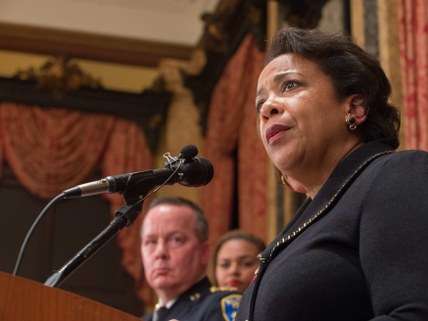The Justice Dept.'s Costly Reform Agreement with Baltimore Police Explains Basic Appropriate Behavior
Are they 'fixing' the department or just rebuilding it from scratch?


There's something to be said that the Department of Justice's newly released consent agreement with the City of Baltimore's Police Department seems to need to explain that officers should not just be total jerkholes when talking to citizens.
Really, there's a small section in the 227-page reform plan that explains how they expect police to behave when speaking to average Joes who are not being detained and are not being suspected of a crime:
The Parties recognize that Voluntary Contacts between police officers and the public are an important component of effective community policing. BPD will encourage officers to speak with members of the public in a friendly, professional manner to enhance communication, trust, and understanding. These Voluntary Contacts will underscore BPD's commitment to community-oriented policing and will also help officers build relationships with community members that may later assist criminal investigations.
The contents of the agreement were released this morning after five months of negotiation between Baltimore and the Department of Justice. As I predicted yesterday, huge chunks of the report are about calling for more training and reporting and record-keeping. But to my surprise, there's actually an entire section of the report dealing with "misconduct investigations and discipline." It takes up about 35 pages of the report.
Before that is page after page after page explaining basic constitutional policing. The agreement includes things like requiring police officers have reasonable suspicion to detain and search people, and not engage in warrantless searches; only arrest people for suspicions of crimes (no really, this is explained); stop using "boilerplate" language in reports to explain reasons behind stops and searches; not engage in racial profiling; not use information they know is not true to justify searches or arrests; attempt to de-escalate encounters before using force; not use force to punish people for resisting or attempting to flee (what the rest of us refer to as "police brutality"); don't use Tasers on elderly people, pregnant women, and small children, or just to stop people from fleeing; use seatbelts or restraining devices on people being transported (remember this is all partly due to the Freddie Gray case); respect the rights of citizens to both criticize police and observe and record public police behavior without retaliation; not retaliate against people who file complaints against police conduct; and so many, many, many other things. A read through the consent decree feels like the documentation of how most citizens expect their police to behave already.
The section on handling police misconduct complaints is so long because, like everything else in the report, it documents every single step of expectations and demands training, and it reads almost like they're building a police department from scratch (which I suspect the Justice Department imagines in their heads exactly that). It is heavily focused on processes and transparency. Neither of these are bad things, but the manipulation of processes to protect bad cops is a consistent problem. "We followed procedures—therefore everything is fine."
A couple of interesting things to point out in connection with managing police conduct: The agreement calls for checking the disciplinary and certification background of potential new hires, including consulting with the National Decertification Index. Anthony Fisher wrote about this database in September and how it helps stop hires of officers with histories of misconduct (and how it has gaps). There's also this vague but important agreement: "BPD will eliminate policies that authorize the expungement of records where an employee accepts discipline."
Implementing all this mandated training and documentation system is not going to be cheap. But it's not clear how much it will cost. According to The Baltimore Sun, the city's spending committee unanimously approved the spending money to implement reforms without knowing the costs. The agreement calls for a monitor who may be paid up to nearly $1.5 million annually. There's a lot of money to be made from reforming a police department, and many, many people are going to have their hands in the till. The index at the end of the report compiles all the new training requirements mentioned in the decree. There are 23 separate new training demands.
Skim through the full consent decree here.
Editor's Note: As of February 29, 2024, commenting privileges on reason.com posts are limited to Reason Plus subscribers. Past commenters are grandfathered in for a temporary period. Subscribe here to preserve your ability to comment. Your Reason Plus subscription also gives you an ad-free version of reason.com, along with full access to the digital edition and archives of Reason magazine. We request that comments be civil and on-topic. We do not moderate or assume any responsibility for comments, which are owned by the readers who post them. Comments do not represent the views of reason.com or Reason Foundation. We reserve the right to delete any comment and ban commenters for any reason at any time. Comments may only be edited within 5 minutes of posting. Report abuses.
Please to post comments


She's in the University of Baltimore law school (Angelos Edition) right now!
stop using "boilerplate" language in reports to explain reasons behind stops and searches;
Sounds like our docs cutting and pasting notes from one patient's chart to another's.
Furtive movement! I'm totally stealing that, dude!
IMHO police, like many other people writing routine activity reports, use "boilerplate" because:
A. They aren't English Lit majors gifted with the ability to write clear, original expositions in one draft and;
1. The same stuff happens to them time after time and there are only so many ways to say, "I pulled him over because his car was weaving back and forth," and;
a. Writing reports already takes two or three times longer than the actual incident.
The problem is that a lot of these cops aren't smart enough to remember to *change* up the specifics according to the situation.
Boilerplate's fine as a template - but you need to customize is as necessary.
A read through the consent decree feels like the documentation of how most citizens expect their police to behave already.
It feels like they're totally disrespecting police culture.
Yet another front in the War on Cops
IF I believed they had any intention of actually reforming I'd say it was probably the best investment the city of Baltimore could ever make. Even if it cost them $50 million to complete the reforms they'd make that back in reduced legal fees and payouts for police brutality cases and increased tax revenues as some areas of the city previously barely a step above Lybia for safety become open for business again.
Is the DoJ working on the Chicago police dept? Chicago spends $1M per week on settling/losing lawsuits. Not to mention the Homan Square black building where nefarious interrogations, etc. were (are?) conducted. Seems like that should be front page news. It would be a waste of pixels for me to ask why we aren't seeing headlines about federal charges against police and pols running such a place, so I won't mention it.
Wrt the alt-text, does Loretta Lynch have such access?
1.5 million dollar salary to be a police dept. monitor.
Sign me up. Oh God would I have fun with that.
This is the sort of stuff that Sessions was complaining about, and he's right to complain if this sort of thing is fairly common and it's only because one or two bad cops aren't following the rules. Very pushy of the Feds to get involved in purely local affairs.
But it sure does sound to me that you're exactly right, the Feds are building a police force from the ground up because Baltimore doesn't have a police force that meets the basic standards for what constitutes a professional police force, they're all bad cops. The Feds are right to say you can't just conduct your police business any old way you want, there are certain standards you have to meet wrt to respecting Constitutional rights.
So how widespread are these sorts of consent decrees? Too widespread, as Sessions would have it? Or not widespread enough?
Both.
They're very widespread and they're very pointless.
Detroit is coming out from under one after a decade. Would you say that the Detroit PD is an effective organization that respects civil rights today?
Frankly, you don't build an effective and uncorrupt police department from the skeleton, muscles, internal organs, and brain of the previous one. You break it up, burn it to the ground, and start from scratch deliberately avoiding anyone that had any association with the previous organization.
If you don't, you'll never get rid of the entrenched attitudes of middle-management and the line troops, no matter how onboard your senior people are with the new direction.
More war on cops.
heck that!
Did you mean jerk or asshole? Because "jerkholes" is just an euphemism.
Or, as it's known around here, the Full Dunphy.
Neither. They're producing a lot of paper and hot air that will allow a few people to boost their careers on the *claim* of 'fixing' BPD while changing absolutely nothing - all this stuff does is deflect the news cycle long enough for people to get bored and get outraged by the latest Trump pee scandal.